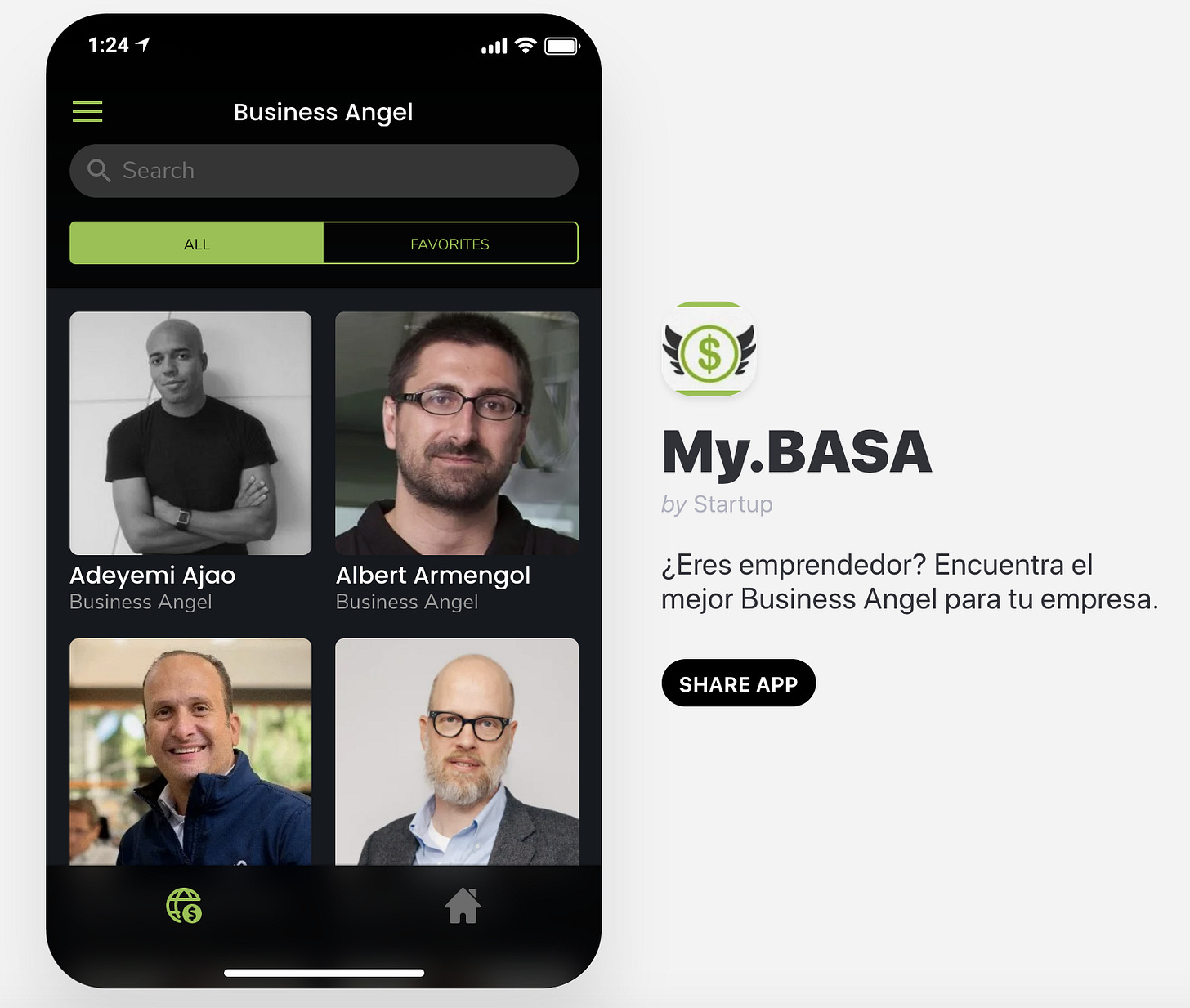🌊 Chase Problems, Not Ideas: Sam Altman's Framework
YC’s startup idea checklist, Sam Altman’s ammunition, Spain’s Investor App and more!
I’m Ivan Landabaso, VC at JME.vc. I also love surfing and combat sports. Welcome to Startup Riders, your bi-weekly startup caffeine.
Summary | TL;DR
💡 YC’s startup idea checklist: Chase a problem, not an idea.
🔥 Sam Altman’s ammunition: Lessons from OpenAI’s CEO.
👼 Spain’s Angel Investor App: Who to talk to when raising $.
💵 Recent Deals: PLD Space, Exoticca, APlanet, Nemuru, etc.
🦄 Startup Jobs: A list of jobs from recently funded startups.
💭Thinking or Reading: Trillion $ coach, Airbus 0-emissions etc.
Check out the Community Group to meet fellow riders and share your experience 🤙
💡 YC’s startup idea checklist
If you haven’t subscribed to Y Combinator’s Youtube channel (for free, mind you) - you should. We partnered with our friend @bamarc to serve you a quick snapshot of the “Evaluating Startup Ideas” episode:
1) Find a great PROBLEM (not an idea or solution)
First think of the problem that:
Is popular (millions of people have this problem)
Is a growing market (20% YoY to make sure there’s demand)
Is urgent (people want a solution right now)
Is expensive to solve (so that billions can be made)
Is mandatory (customers absolutely need it; e.g. a law just changed)
Is recurrent / happens frequently (hourly; users come back multiple times a day)
YC highlights that your idea doesn’t need to check all of these BUT it should have at least one, and preferably multiple of them.
2) Work on the SOLUTION (in that order)
Startup ideas are hypotheses. It is a founder’s job to figure out how to construct it.Work on the solution - what is the experiment we’re running?
Again, most importantly, don’t start with the solution.
⚠️Avoid SISP: Solution In Search of a Problem. This is a much harder way to succeed and is inefficient.
3) Identify your UNFAIR ADVANTAGE 🎯
Unfair advantages. Why are you going to win over everyone else? You need at least one insight. It’s essential to understand why you’re winning. Most companies won’t have them all but great ones will have several:
Founder expertise. Are you the 1 in 10 of the world's people who can solve the problem? 99% aren’t (even in YC batches). This typically requires a huge expertise level (e.g. PhD in biotech with a patent to solve a specific drug.)
Market. Is it growing at 20% a year? By default, if you build a solution you should automatically grow. If it is your only unfair advantage, it’s the weakest one you could have (you need something in addition to this).
Product. Is your product 10x better than the competition? It has to be very clear that it is. Could be 10x faster, or 10x cheaper. If it’s 2x or 3x that’s nice, but it should be 10x.
Acquisition. If you get popular, a lot of competitors will come to the space. Your advantage will quickly fade away. Forget paid-in acquisition (e.g. Facebook ads). You want a model that gets users at no cost, $0 (e.g. word of mouth). This is a great exercise at the beginning of your startup: How do I grow this without spending money? In the beginning you have to do things that don’t scale.
Monopoly. As your company grows, is it more difficult for you to be defeated by competitors? Good company examples of this are marketplaces (one big winner; e.g. Amazon) or those with network effects (as the company grows, so does its value).
🔥 Sam Altman’s ammunition
The title is not great - he calls it “How to be successful” (stop rolling your 👀). 100% worth a read for those of you who are on the fence about starting up. My faves:
1. Compound yourself: It’s important to move towards a career that has a compounding effect—most careers progress fairly linearly. You don't want to be in a career where people who have been doing it for two years can be as effective as people who have been doing it for twenty—your rate of learning should always be high.
2. Have almost too much self-belief: If you don’t believe in yourself, it’s hard to let yourself have contrarian ideas about the future. But this is where most value gets created. Cultivate this early. Self-belief is immensely powerful. The most successful people I know believe in themselves almost to the point of delusion.
3. Learn to think independently: “I will fail many times, and I will be really right once” is the entrepreneurs’ way. You have to give yourself a lot of chances to get lucky.
4. Get good at “sales”: All great careers, to some degree, become sales jobs. You have to evangelize your plans to customers, prospective employees, the press, investors, etc. This requires an inspiring vision, strong communication skills, some degree of charisma, and evidence of execution ability.
5. Make it easy to take risks: Startup’s are asymmetric bets. Most people overestimate risk and underestimate reward. Look for small bets you can make where you lose 1x if you’re wrong but make 100x if it works. Then make a bigger bet in that direction.
6. Focus: It is much more important to work on the right thing than it is to work many hours. Most people waste most of their time on stuff that doesn’t matter. Via “Visualize Value”":
8. Be bold: Follow your curiosity. Things that seem exciting to you will often seem exciting to other people too.
9. Be willful: A big secret is that you can bend the world to your will a surprising percentage of the time—most people don’t even try, and just accept that things are the way that they are.
10. Be hard to compete with: The best way is to build up leverage. For example, you can do it with personal relationships, by building a strong personal brand, or by getting good at the intersection of multiple different fields.
11. Build a network: An effective way to build a network is to help people as much as you can. Doing this, over a long period of time, is what lead to most of my best career opportunities and three of my four best investments.
👼 Spain’s Angel Investor App
We partnered with our friend @aramdaucik to launch a quick Spanish Business Angels App - (if you haven’t already, try Glide to build apps with no-code, super fun).
We also built an Angel Twitter List so you can follow / get to know these folks and most importantly, what they typically invest in - so you can approach the right ones.
If you have any feedback - we’re all 👂.
💵 Recent Deals
APlanet raises 1,7 million led by All Iron Ventures.
DevoTechnology raised $60 million led by Georgian.
Exoticca raised €11 million, led by Milano Investment Partners.
PLD Space raised €7 million from Arcano.
Streamloots raised $5.6 million led by Bessemer.
Nemuro raised €2.4 million led by InnoCells.
Swipcar raised €1.5 million led by Inveready.
Assembler raised 800K.
Dolnai raised €800,000.
Exum raised 500K
Atribus raised €500k
Incapto Coffee raised €500k
Deliberry raised €450k
Brava Fabrics raised €430k
Oroi raised €400k
Bcn10 raised 300K
Ciclogreen raised €300k
Wolo raised €250k
Berba raised 250K.
Fancision raised €150k
Rentger raised 120K.
🦄 Startup Jobs
As usual, list of recently funded startup jobs + Snapshot
💭Thinking or Reading
Stanford: Startup investment decision analysis - interesting decision-tree.
Trillion Dollar Coach - by Eric Schmidt. Biggest take-aways via 15 min books:
#1 – You need a coach; you need to do some coaching.
#2 – All coaching starts with, and is built upon, trust.
#3 – The real basics are non-negotiable; listen; care; love… and wander around.
#4 – “Soft skills” matter.
#5 – For business success, it’s a product game. Product before sales and marketing.
#6 – And, we probably need more “fun” time outside of work with people we work with.
If you find this interesting, please consider sharing with your friends. I’d also love to get your thoughts and feedback on Twitter. Until the next one! 😃











Hey! Would be great if you add short description of a company in recent deals list 🖖